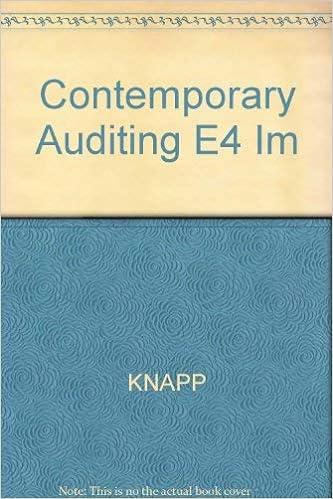Question
Apply the Concepts: Activity-Based Customer Costing A Company produces precision parts for 11 major buyers. Of the 11 customers, one accountsfor 50 percent of sales
Apply the Concepts: Activity-Based Customer Costing
A Company produces precision parts for 11 major buyers. Of the 11 customers, one accountsfor 50 percent of sales and the other 10 account for the remainder of sales, who purchase parts in roughly equal quantities. Orders are priced by adding manufacturing cost to ordering costs and then adding a 20 percent markup. Under this pricing structure, the large customer approaches Thompson and reveals a bid from a Thompson competitor that is $0.50 per part less than Thompson charges and threatens to take its business elsewhere without a price concession.
| One Large Customer | Ten Smaller Customers | |||
| Units purchased | 750,000 | 750,000 | ||
| Orders placed | 3 | 300 | ||
| Manufacturing cost | $4,500,000 | $4,500,000 | ||
| Order-filling cost allocated* | $443,000 | $443,000 | ||
| Order cost per unit | $0.591 | ** | $0.591 | ** |
*Order-filling capacity is purchased in blocks (steps) of 45, each step costing $40,000; variable order-filling activity costs are $2,000 per order. The activity capacity is 315 orders; thus, the total order-filling cost is $886,000 [(7 $40,000) + ($2,000 303)]. Current practice allocates ordering cost in proportion to the units purchased; therefore, the large customer receives half the total ordering cost.
**rounded
1. Calculate the unit price offered to Thompson's customers using the current order-filling cost allocation (round to nearest cent):
Unit price:
2. Assign order-filling costs to each customer type using number of orders placed and then calculate the new unit price for each customer type. Round the rate to the nearest dollar and the unit prices to the nearest cent.
New unit price (large customer):
New unit price (small customer):
3. What if Thompson offers a discount for orders of 10,000 units or more to the smaller customers? Calculate the following assuming that all ten customers increase the order size to exactly 10,000 units.
Number of orders (small customers):
New total ordering cost:
Order filling rate (round to nearest dollar):
New small customer ordering cost:
New small customer unit price (round to the nearest cent):
Please help explain how to get to the corect answer?
Step by Step Solution
There are 3 Steps involved in it
Step: 1

Get Instant Access to Expert-Tailored Solutions
See step-by-step solutions with expert insights and AI powered tools for academic success
Step: 2

Step: 3

Ace Your Homework with AI
Get the answers you need in no time with our AI-driven, step-by-step assistance
Get Started


